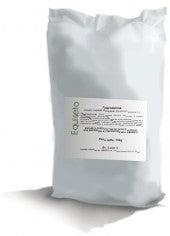HORSEQUISETO ARVENSE IN MICRONIZED POWDER
Have a question?

HORSEQUISETO ARVENSE IN MICRONIZED POWDER
Dettagli
Composition
Characteristics
It is a totally natural vegetal matrix obtained from the micronization of the sterile aerial stems of Equisetum arvense L. Due to the high silica content (about 18% of the ash) and sulfuric salts it is considered by the biodynamic literature as the most classic support for antifungal action.
The use of dehydrated powder gives the product a longer shelf life.
Methods and doses of use
There are two types of preparation with different concentrations. To obtain 100l of product to apply on crops, macerate 200g of horsetail (type A decoction) or 225g (type B decoction) in 10 liters of water for 30 minutes and then boil for 45 minutes. After cooling, the decoction is filtered through a fine sieve and then further diluted with water to 100 litres. The preparation thus made must be applied within a maximum of 24 hours, in order to avoid oxygenation and the potential for microbiological contamination that can occur during storage. The solvent for extraction and preparation is drinking water with an optimal pH of 6.5, in case a buffer product is used (e.g. Citric Acid ).
| Culture | Adversity | Decoction | It has | Apt No. |
| Apple, peach | White sore, Blister, Scab | TO | 500-1000 | 2-6 |
| Lives | Peronspora, Powdery Mildew | TO | 100-300 | 2-6 |
| Cucumber | Powdery mildew, root rot |
TO
|
300 | 2 |
| Tomato | Alternaria, Rust | TO | 300 | 2 |
| Strawberry, Small fruits | Botrytis, powdery mildew, and other cryptogams | B | 300 | 4-8 |
| Potato | Alternaria, Powdery Mildew, Peronspora | B | 300 | 4-8 |
Store at a temperature between 4°C and 25°C in its original packaging, tightly closed, protected from light and humidity. The user assumes all responsibility for incorrect handling, application and storage of the product.
Basic substance permitted pursuant to EC regulation 1107/2009
and document SANCO/12386/2013
HORSETAIL
PREVENTIVE FOR FUNGAL DISEASES
Horsetail (Equisetum arvense), together with nettle, is one of the most important plants for the care of our vegetable garden: it helps us in the prevention of cryptogamic diseases (against fungi) and in the fight against parasites.
Horsetail, present in 11 different varieties, is found everywhere in Europe, on the edges of ditches and roads, especially if there is water nearby. Considered a weed, it is harvested in summer to prepare macerates, decoctions or infusions. The high content of silica and sulfuric salts makes it an excellent adjuvant against downy mildew, rust, powdery mildew, botrytis and other fungal diseases.
Horsetail can be used in the form of an infusion or decoction, but there are also those who use it to produce macerate.
In any case, the dosage is: 1 kg of fresh horsetail or 300 g of dried plant for 5 – 10 l of water.
My advice is to make a decoction boiled for an hour with the lid on 300 gr. in 5-10 liters of water.
To obtain the decoction, the horsetail must be left to soak in water for at least 48 hours, then it must be heated until boiling, which must continue gently for an hour. The liquid obtained can be diluted 4 or 5 times; it is always a good idea to dynamise it like biodynamic preparations for at least 20 minutes because it increases its effectiveness and can be used directly to irrigate the soil with coarse drips or fine spraying on the plants (both vegetables and fruits) whenever our vegetable garden needs to be protected from attack by fungi or have structural weakness problems.
The addition of 0.5-1% sodium silicate increases its effectiveness and persistence on the leaves.
It is excellent to use it as a preventative for fungal diseases from Easter Sunday or before or after persistent rain.
Another much more effective use is 508 (Horsetail Horn). See sheet on www.agribionotizie.it in the biodynamic section - preparation sheets


